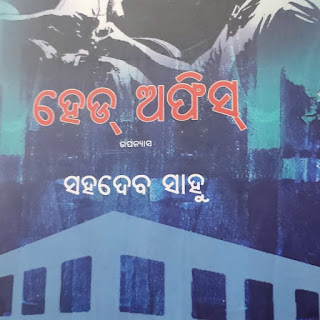One day, in 1986 or 87, I was in the quarters of an
MLA, an acquaintance whom I called uncle, his nephew being my friend. He had
gone somewhere. I was chatting with his wife. I caught sight of a heap of books
under a cot. Those were Ramayan and Mahabharat in odia written by J.B.Patnaik,
then Chief Minister of Odisha. I asked his wife, “What is uncle doing with the
books?” His wife said, “Your uncle has bought two hundred books of the CM to
distribute among the readers, of course, in order to impress him. You can take
two, one Ramayan and one Mahabharat.” I got two books free.
Another day, after a few years, I was with Umesh
Prasad Sahu, the publisher of Bharat Bharati. He published the books of the former
CM. While chitchatting I said about Ramayan and Mahabharat which I got free
from the MLA’s quarters. Umesh Prasad
said, “The book ultimately reaches the reader.”
( Reactions of Priyadarshini , an Amazon reader on Amazon's customer review page on Head Office)
Readers, particularly of regional literature, are
depleting over the years. The reasons are many. One reason, maybe, intrusion of
TV into the drawing rooms with a large number of entertaining channels. Before
spread of TV, an employee or an educated person used to pick up a magazine or
book after he returned from office. Now TV has taken that time. Parents stress
now their children on teaching in English medium schools. English knowledge or
proficiency in English, they believe, brings them jobs. Another reason, and an
important one, pressure on the students to seek more marks, and concentrate in
studies only, so that they get seats in good colleges or universities, in other
words, to land in secure jobs with handsome salary. They don’t have time for
literature or play on the fields. They also even don’t have time to socialize.
Their parents and well wishers also don’t encourage and they consider reading
books, other than the textbooks, is wastage of time.
Still books sell, but books in English. Since the people
prefer their children educated in English medium, the readers in English are
increasing, and that is, at the cost of regional literature. Writers like
Chetan Bhagat or Devdutt Patnaik are great success. Chetan’s books sell in
millions. But the readers having a taste for literature will read books not
only of English, but also books in the language he speaks or he will learn the
original language, if possible, the book written in, to get the charm and feel
of the book. Translation compromises originality.
(Kamal's reaction on the novel Head Office received as WhatsApp message)
I would like to give a couple of examples I have come
across. I was in Cuttack. There is a magazine stall in Mangalabag I used to visit
at least once in a week. Besides Odia magazines, he also sells English, Hindi
and Bengli magazines. During Durga Puja he sells as many Bengli Puja special
magazines as Odia magazines. The owner of the stall says, not only the Bengli
speaking people, but also many Odias buy the Bengli magazines, especially the
Puja special issues. Many Odias also buy Hindi magazines.
Apoorv Sarkar was working from the TCS in our office. He
was from West Bengal, a Bengli speaking young man. He was a lover of books. He
was excited to know I did write. Then, in 2007, my novel Kashatandira Swapna (Dreams of Kash Flowers) had just come out to
market. He wanted to read and to read in Odia he started learning the language.
He left TCS and joined another company. After around six months, one day he
rang me up and told, he had finished my novel and also gave his comments on the
book saying he identified him with the protagonist of the novel. The main
character of the novel, Ajay has struggled to stand in the society, more or
less, Apoorv had the same experience. He requested to suggest him good Odia books
he should read.
Apoorv’s case maybe an exception, but it proves the
point that a person having a taste for literature will like to learn the
language he speaks, though he cannot write or read, to read the books written
in his/her mother tongue. This is not a big deal for a book lover. An English
medium educated child does not have much difficulty to learn his/her mother
tongue.
*****



